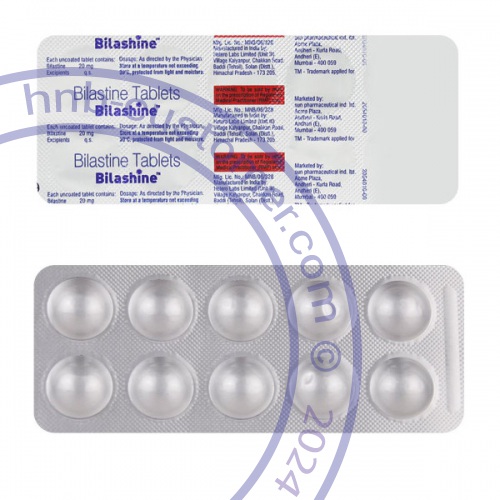Ilaxten
Bilastine


Marca(s)
Fabricante
- Glensmith Labs / Sun Pharmacies
Diseases
- Sneezing / Itchy / Runny / Blocked-up Nose And Red And Watery Eyes
Bilastine tablets
What is this medicine?
Bilastine is an antihistamine. Bilastine is used to relieve the symptoms of hayfever (sneezing, itchy, runny, blocked-up nose and red and watery eyes) and other forms of allergic rhinitis. It may also be used to treat itchy skin rashes (hives or urticaria).
What should my health care professional know before I take this medicine?
They need to know if you have any of these conditions: :
- if you are allergic to bilastine or any of the other ingredients of this medicine.
What may interact with this medicine?
Tell your doctor or pharmacist if you are taking, has recently taken or might take any other medicines, including medicines obtained without a prescription. Some medicines should not be taken together and others may need their doses to be altered when taken together.
Always inform your doctor or pharmacist if you are using or receiving any of the following medicines in addition to Ilaxten:
- Ketoconazole (an antifungal medicine)
- Erythromycin (an antibiotic)
- Diltiazem (to treat angina)
- Cyclosporine (to reduce the activity of your immune system, thus avoiding transplant rejection or reducing disease activity in autoimmune and allergic disorders, such as psoriasis, atopic dermatitis or rheumatoid arthritis)
- Ritonavir (to treat AIDS)
- Rifampicin (an antibiotic)
Possible side effects
Like all medicines, this medicine can cause side effects, although not everybody gets them.
Side effects that may be experienced in children are:
Common: may affect up to 1 in 10 people
- rhinitis (nasal irritation)
- allergic conjunctivitis (eye irritation)
- headache
- stomach pain (abdominal - /upper abdominal pain)
Uncommon: may affect up to 1 in 100 people
- eye irritation
- dizziness
- loss of consciousness
- diarrhoea
- nausea (the feeling of being sick)
- lip swelling
- eczema
- urticaria (hives)
- fatigue











